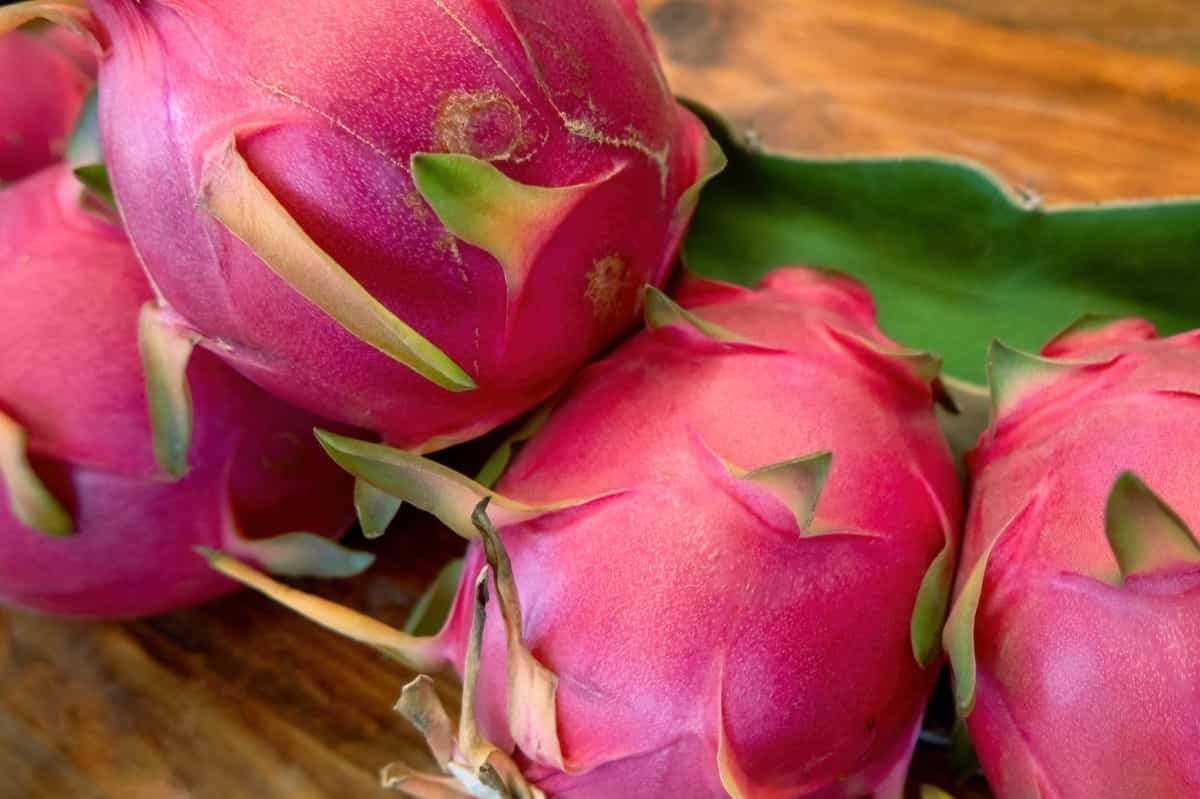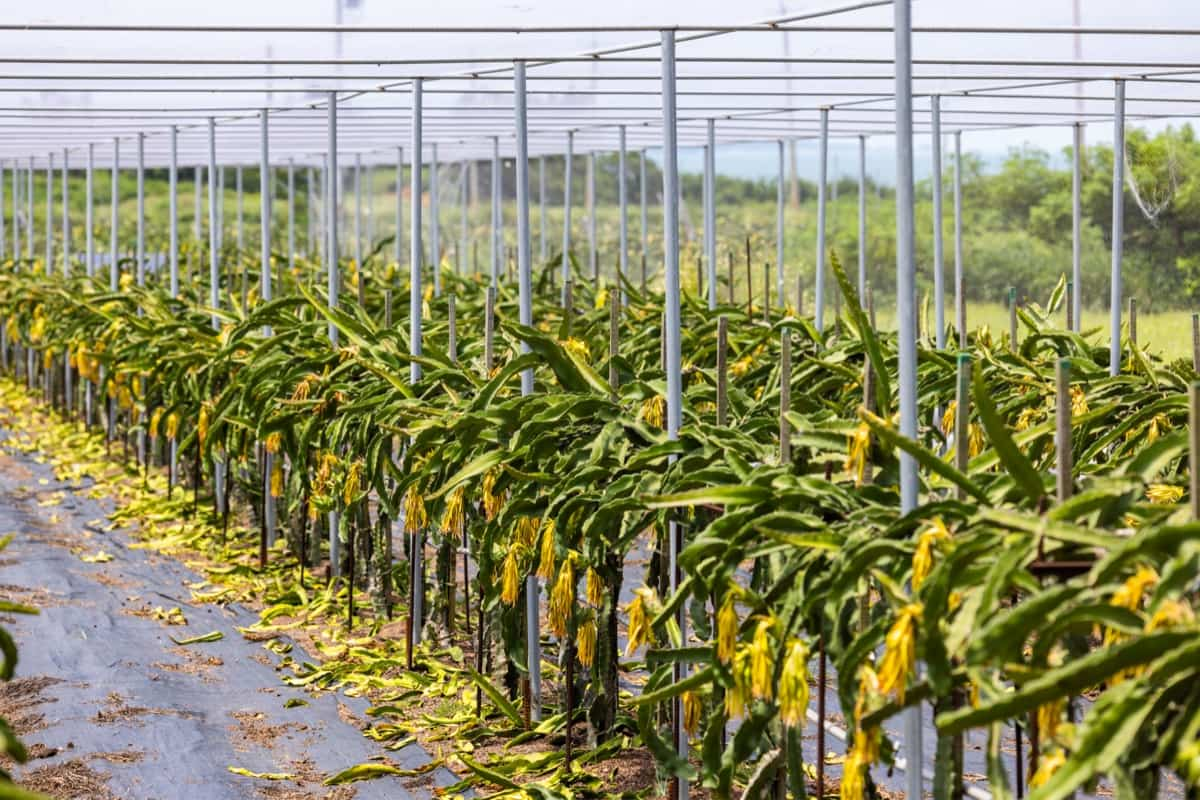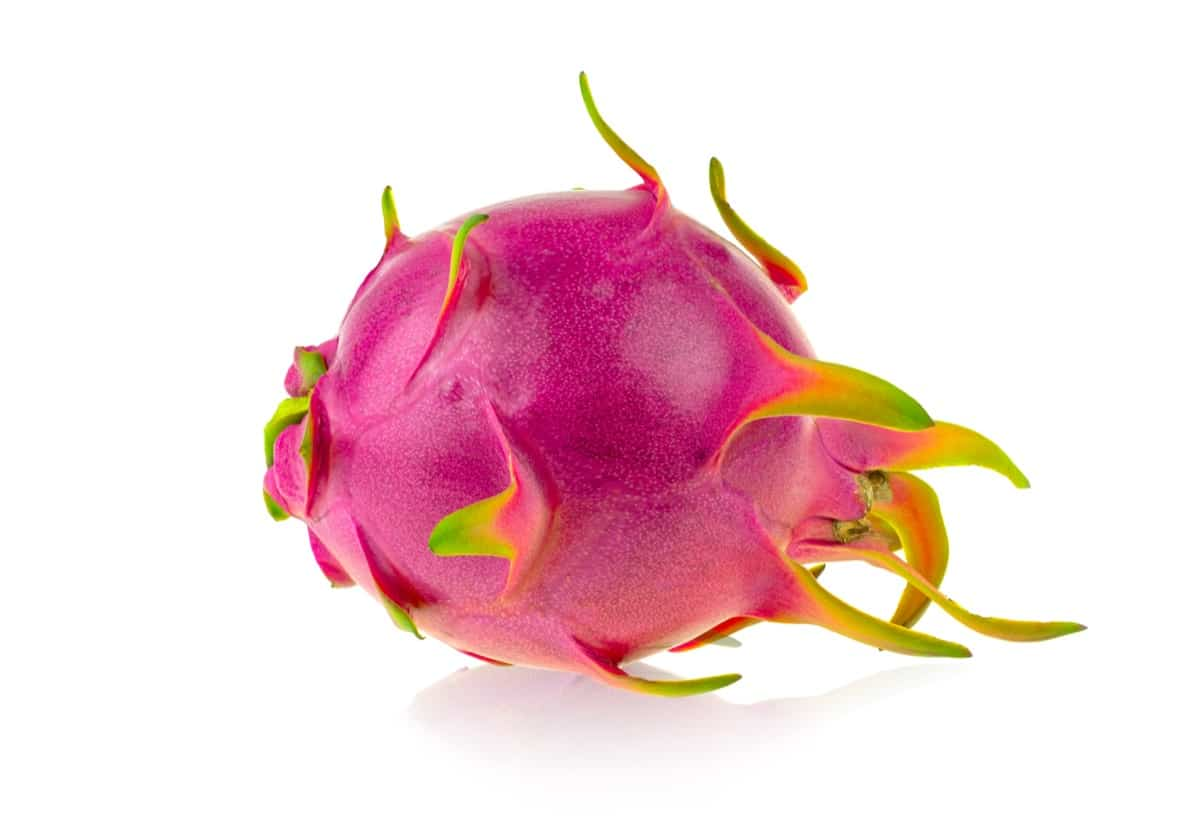Managing weeds in dragon fruit farms is crucial for the health and productivity of your crops. Weeds can compete for resources, host pests, and provide shade that hinders the growth of dragon fruit plants. To maintain a healthy dragon fruit farm, consider implementing the following strategies and techniques for effective weed management.

Managing Weeds in Dragon Fruit Farms
Preventive Measures: Mulching and Cover Cropping
Mulching involves covering the soil around dragon fruit plants with organic materials such as straw, wood chips, or plastic sheets. This layer acts as a barrier, preventing weed growth by blocking sunlight and hindering weed seed germination. Additionally, mulch retains soil moisture, regulates temperature, and enhances soil fertility.
Cover cropping entails planting fast-growing, low-maintenance crops between dragon fruit rows. These cover crops compete with weeds for space and nutrients, suppressing their growth. Also, they improve soil structure and reduce erosion, promoting a healthier dragon fruit orchard.
Physical Control: Hand Weeding and Hoeing
For managing weeds in dragon fruit farms, Hand weeding requires labor-intensive efforts, where workers physically uproot or cut weeds by hand. It is effective for smaller areas or around individual plants. Hoeing involves using a tool to cut weeds just below the soil surface, disrupting their growth. Both methods are eco-friendly and help in immediate weed removal. However, they can be time-consuming and require constant vigilance as dragon fruit farms often have a trellising system that demands careful weed management to maintain plant health and fruit quality.
Chemical Control: Herbicides
Herbicides effectively control weed growth by suppressing or killing unwanted plants. For managing weeds in dragon fruit farms, selective herbicides, such as glyphosate, can target specific weed species while leaving dragon fruit plants unharmed. Pre-emergence herbicides are applied before weed seeds germinate, preventing their growth.
Post-emergence herbicides are used on existing weeds. Following recommended application rates, timings, and safety precautions is essential to minimize environmental impact and protect crop health. Frequent monitoring and rotation of herbicides help prevent weed resistance, ensuring dragon fruit farms remain productive and weed-free.
Cultural Control: Adjusting Farming Practices
Proper spacing between dragon fruit plants can reduce weed competition for nutrients and sunlight. Mulching with organic materials like straw or wood chips helps suppress weed growth while retaining soil moisture. Regular and reasonable irrigation, promoting drip systems, and avoiding excessive watering can limit weed proliferation. Additionally, practicing crop rotation and intercropping with compatible species can disrupt weed life cycles and promote a healthier dragon fruit farm ecosystem.
In case you missed it: How to Prepare the Soil for Dragon Fruit Cultivation

Biological Control: Biological Pest Control Agents
- Ladybugs: These voracious predators feed on aphids and other soft-bodied pests that can damage dragon fruit plants.
- Predatory Mites: These tiny mites prey on harmful mites, such as spider mites, which can weaken dragon fruit plants.
- Parasitoid Wasps: These wasps lay their eggs on or in the eggs or larvae of pests like caterpillars.
- Beneficial Nematodes: These microscopic worms target soil-dwelling pests, effectively reducing their populations.
Integrated Weed Management
Integrated Weed Management (IWM) is a comprehensive approach For managing weeds in dragon fruit farms, that combines various strategies and techniques to minimize weed competition and promote crop health. It involves a multi-pronged approach, including cultural, mechanical, biological, and chemical methods tailored to the farm’s needs.
Cultural practices like mulching and proper spacing reduce weed germination and growth, while mechanical methods such as regular mowing and cultivation physically remove weeds. Biological control may involve introducing natural weed predators, and targeted herbicide application is considered a last resort. By using these strategies in harmony, IWM optimizes weed control while minimizing environmental impact.
Mechanical Control: Mowing and Cutting
Mechanical control, specifically mowing and cutting, plays a crucial role in maintaining weed-free dragon fruit farms. Mowing involves using specialized equipment to trim unwanted vegetation at ground level. This method helps prevent weeds from overshadowing and competing with the dragon fruit plants for essential nutrients, sunlight, and moisture. Regular mowing also disrupts weed seed production, reducing their population over time.
Cutting involves manually removing individual weeds, particularly those growing close to the dragon fruit plants. This targeted approach ensures that weeds are eliminated without causing harm to the desired crops. Both techniques are cost-effective and environmentally friendly alternatives to chemical herbicides.
Solarization: Using the Sun to Control Weeds
This technique involves covering the soil with transparent plastic sheets during the year’s hottest months. The sun’s energy heats the soil, raising temperatures to lethal levels for weed seeds and pathogens. This process kills existing weeds and prevents weed germination by sterilizing the topsoil. Solarization helps reduce the need for herbicides and promotes a healthier, weed-free environment for dragon fruit cultivation.
Flame Weeding: Using Fire to Control Weeds
Flame weeding, a powerful and eco-friendly method, is gaining popularity in dragon fruit farms for weed control. This technique involves using controlled bursts of open flame to incinerate unwanted weeds while leaving the dragon fruit plants unharmed. With precision and reduced chemical usage, flame weeding provides an effective solution to combat weed competition and promote a healthier crop.
The advantages of flame weeding in dragon fruit farming include minimal soil disturbance, reduced herbicide reliance, and the elimination of labor-intensive manual weeding. It’s an eco-conscious approach that prevents soil erosion, conserves moisture, and maintains a favorable microclimate around dragon fruit plants. Additionally, it is time-efficient and can cover large areas swiftly. However, caution and proper training are crucial, as fire can be hazardous.
Laser Weeding: Using Lasers to Control Weeds
This technique employs high-powered lasers to selectively target and eliminate unwanted vegetation while sparing the dragon fruit plants. The lasers emit intense, focused light that damages the weeds’ cellular structure, causing them to wither and die. Laser weeding offers several advantages, including precision targeting, minimal soil disturbance, and reduced herbicide usage, promoting sustainable agriculture. It requires specialized equipment and expertise but proves highly effective in weed control, ensuring healthier dragon fruit crops.
In case you missed it: Essential Tools and Equipment for Dragon Fruit Farming

Dragon fruit farms benefit from laser weeding due to its precision, reducing damage to the prized fruit plants while effectively eradicating weeds. The lasers are programmed to recognize and zap weeds selectively, leaving the dragon fruit cacti unharmed. This method offers several advantages, including reduced chemical usage, minimal soil disturbance, and increased efficiency in weed management.
Conclusion
In conclusion, effectively managing weeds in dragon fruit farms is vital for crop health and yield. Combining strategies, including laser weeding, herbicides, mulching, and manual methods, can provide comprehensive weed control. By adopting these techniques, dragon fruit growers can ensure healthier crops, minimize competition from weeds, and promote sustainable farming practices.
- Feed Your Flock for Less: Top 10 Tips to Save on Chicken Feed
- Ultimate Guide to Ossabaw Island Hog: Breeding, Raising, Diet, and Care
- Hatching Answers: The Top 10 Reasons Your Chickens Aren’t Laying Eggs
- Eggs and Economics: Breaking Down the Cost of Raising Backyard Chickens
- Defend Your Greens: Proven Methods to Keep Iguanas Out of Your Garden
- Ultimate Guide to Cinnamon Queen Chicken: A Comprehensive Guide for Beginners
- Ultimate Guide to California Tan Chicken: Breeding, Raising, Diet, Egg-Production and Care
- Ultimate Guide to Marsh Daisy Chicken: Breeding, Raising, Diet, and Care
- 10 Types of Chicken Farming Businesses You Can Start for Profits